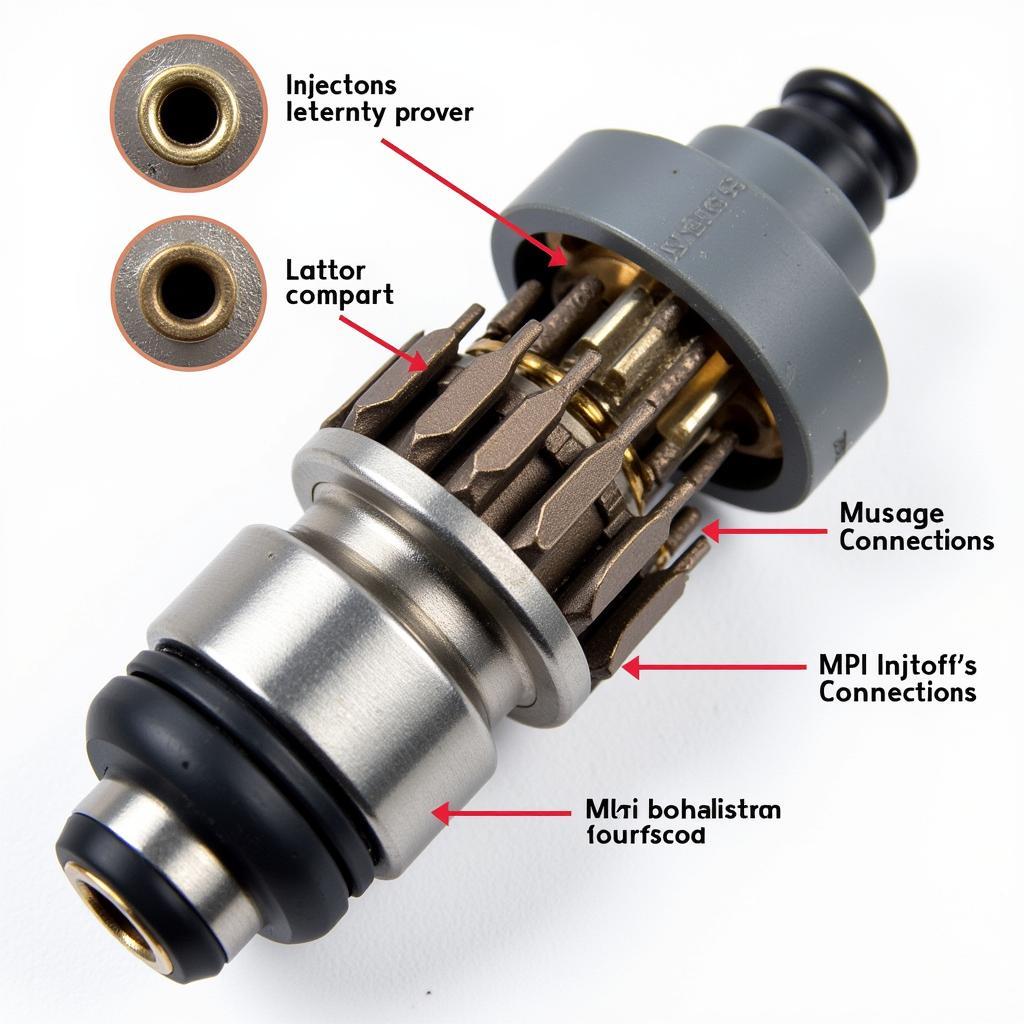Multi-Point Injection (MPI) is a fuel injection system used in internal combustion engines, particularly prevalent in older vehicles. It delivers fuel to each cylinder’s intake port using a single fuel rail and multiple injectors. Understanding what MPI is and how it functions is crucial for anyone involved in car service, whether a professional mechanic or a car owner. This article will delve into the intricacies of MPI, its advantages, disadvantages, and its role in modern car servicing.
MPI systems represented a significant advancement over carburetors, offering improved fuel efficiency, performance, and emissions control. Unlike carburetors which rely on mechanical principles, MPI uses electronically controlled injectors to deliver precise amounts of fuel to each cylinder. This precise control allows the engine to run more efficiently, especially at varying speeds and loads. Furthermore, MPI systems can adapt to different driving conditions and fuel qualities, ensuring optimal performance.
One of the key components of the MPI system is the fuel rail, a pressurized pipe that delivers fuel to the injectors. The fuel pressure regulator maintains a constant pressure within the fuel rail, ensuring consistent fuel delivery. The Electronic Control Unit (ECU) receives information from various sensors, such as the airflow sensor and oxygen sensor, and uses this data to determine the appropriate amount of fuel to inject.
Understanding the Benefits of MPI in Car Servicing
MPI offers several advantages that contribute to smoother car servicing and overall vehicle health. The precise fuel delivery leads to reduced carbon buildup within the engine, extending the lifespan of components like spark plugs and valves. This, in turn, reduces the frequency of required maintenance.
Furthermore, the electronic control of MPI simplifies diagnostics. The ECU can store diagnostic trouble codes (DTCs) that pinpoint issues within the fuel injection system, making it easier for mechanics to identify and resolve problems. This reduces diagnostic time and improves the efficiency of car servicing.
Looking for more information about car maintenance? Check out how to find my car’s service history.
The Disadvantages of MPI Systems
While MPI offers significant advantages over carburetors, it does have some drawbacks. MPI systems can be more complex and expensive to repair than carburetors. The electronic components, such as sensors and injectors, can be susceptible to failure and require specialized diagnostic equipment.
Another potential issue is the vulnerability of MPI systems to fuel contamination. Impurities in the fuel can clog the injectors, affecting performance and potentially requiring costly repairs. Therefore, regular fuel filter replacements are essential for maintaining a healthy MPI system.
How Does MPI Work in Different Driving Conditions?
The ECU constantly adjusts the fuel injection based on various inputs, such as engine speed, load, and temperature. At idle, the ECU delivers a smaller amount of fuel to maintain a smooth idle. Under acceleration, the ECU increases the fuel injection to provide the necessary power. Similarly, when the engine is cold, the ECU enriches the fuel mixture to ensure proper starting and warm-up.
Understanding how MPI adapts to different driving conditions is essential for accurate diagnostics and effective car servicing. Mechanics need to consider these factors when troubleshooting performance issues or diagnosing fault codes.
Common Issues with MPI and Their Solutions
Several issues can arise with MPI systems, ranging from minor to major. Clogged fuel injectors are a common problem, often caused by contaminated fuel. Symptoms of clogged injectors include rough idling, hesitation, and reduced fuel efficiency. Cleaning or replacing the injectors is usually the solution.
Failed sensors, such as the airflow sensor or oxygen sensor, can also disrupt the proper functioning of the MPI system. These sensors provide vital information to the ECU, and their failure can lead to inaccurate fuel delivery and performance issues. Replacing the faulty sensor is typically the required fix.
Are you looking to pull up the service history of a used car? Learn more about how dealerships can pull up service history of used car.
John Smith, a certified master technician with over 20 years of experience, notes: “Regular maintenance is key to keeping your MPI system in top condition. Simple things like regular fuel filter changes can prevent costly repairs down the line.”
The Role of MPI in Modern Car Servicing
Although newer technologies like Gasoline Direct Injection (GDI) are becoming increasingly common, MPI still plays a significant role in the automotive landscape. Many vehicles on the road still utilize MPI systems, and understanding their operation is essential for car service professionals.
Diagnostics and repair of MPI systems require specialized knowledge and tools. Mechanics need to be familiar with the various components of the system, their function, and the common problems that can occur.
Want to know more about different car services? Check out which cars Amtrak runs on the Empire Service. Understanding different car service types is useful for all car owners.
Maria Garcia, an automotive engineer specializing in fuel injection systems, adds: “MPI systems offer a good balance between performance, fuel efficiency, and emissions control. While GDI offers certain advantages, MPI remains a reliable and efficient technology.”
Conclusion
MPI is a crucial fuel delivery system that has significantly impacted the automotive industry. Understanding what MPI is in car service, its benefits, drawbacks, and its role in modern vehicles is essential for both car owners and professionals. By staying informed about MPI and its maintenance requirements, drivers can ensure the longevity and optimal performance of their vehicles.
FAQ
- What does MPI stand for? MPI stands for Multi-Point Injection.
- What are the advantages of MPI? Improved fuel efficiency, performance, and emissions control.
- What are the disadvantages of MPI? Can be more complex and expensive to repair than carburetors.
- How does MPI work? It delivers fuel to each cylinder’s intake port using a single fuel rail and multiple injectors.
- What are common MPI problems? Clogged injectors and failed sensors.
- How is MPI diagnosed? Using specialized diagnostic tools like scan tools and fuel pressure gauges.
- Is MPI still used in modern cars? Yes, although newer technologies like GDI are becoming more prevalent.
Interested in different types of service? Check out how to find home health care services.
Do you have any other questions about car service? You might be interested in how to contact HDFC Bank service customer care executive.
Need assistance with your vehicle’s MPI system or any other car service needs? Contact us via WhatsApp: +1(641)206-8880, or Email: [email protected]. Our 24/7 customer service team is ready to help.



